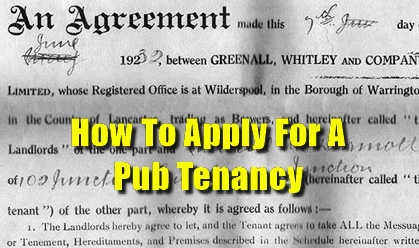For many potential and existing publicans the option of purchasing a freehold pub simply isn’t financially possible, so the alternative for them is to enter into a tenancy or lease agreement with a brewer or pubco.
Much has been written elsewhere on the pros and cons of buying freeholds vs. taking on a tenancy or lease, so this guide will concentrate on the processes involved in securing a tenancy or lease.
For the sake of clarity in this article when I refer to “the landlord” I am referring to the brewery or pubco who own the pub, not the licensee or publican who runs the pub.
Taking on a pub is a serious and life-changing decision and should not be undertaken without seeking prior professional advice from a solicitor, an accountant and a chartered surveyor.
The majority of tenancies and leases available from brewers and pubcos are “tied”, whereby some or all of the drinks sold in the pub must be purchased from the brewer or pubco.
Most tenancies involve limited obligations regarding the repairs and maintenance of the property (usually just internal, non-structural works) and most leases are what is called “fully repairing and insuring” where the lessee is responsible for virtually all the repairs and maintenance of the property.
Tenancies tend to be for a period (or term) of three years and most leases for periods in excess of 5 years. Your ability to end a tenancy or lease earlier than the full term will vary but you should be aware that any lease you pass on to a third party will still leave you “on the hook” for any shortcomings of that third party.
Brewers and pubcos advertise the tenancy and lease opportunities they have available on their websites, instruct commercial estate agents to let them and even place adverts in trade and local press, so finding a suitable pub in your area or an area you are interested in is relatively easy.
For a pretty comprehensive list of pub sales agents, pubcos and brewers here.
The usual method of applying for a pub is via the head office, the larger companies even have dedicated tenant recruitment departments, they will send you information about the pub and application forms etc.
Top Tip – as you may not be successful on your first attempt to rent a pub, that doesn’t mean that you won’t be successful in the future, so it’s worth taking note of who you deal with at head offices as they may be of great use to you in your search for the perfect pub.
Financial and Other Information About The Tenancy or Lease
The details or “particulars” of the business on offer may include barrelage figures, rent required, insurance costs, the term of the tenancy or lease, the split in gaming machine income and their provision, the tie for products such as beer, cider, lager, wines, spirits and soft drinks, any discounts available on the purchase of tied products.
Some information about the pubs trading history in terms of turnover, profit and overheads may also be included, although most of this information is only given over to “seriously interested” parties.
In any event it is your responsibility to gather all the information you require to make an informed business decision and your responsibility to check the voracity of any information provided by either the landlord or any previous tenant/lessee.
The majority of applications for tenancies or leases are passed on to the company area manager responsible for that pub as they, theoretically at least, have detailed knowledge of the pub and its locale. These managers should have a good understanding of the trading pattern and style of the pub in question and the experience and skill set any potential tenant or lessee would need to run a successful business from the premises. They should also have detailed knowledge of the financial information relating to the pub and can often be a valuable source of information not included in the formal particulars or other information provided by the landlord.
Further information on trading history and the books of account of the business may be available from the outgoing tenant or lessee, if they are still in place and trading from the pub. If there is a “sitting tenant” then you should endeavour to gather as much detailed information about the pub from them: 3 years worth of trading accounts (prepared by an accountant), copies of the previous four VAT returns and copies of the last year’s stock take reports. I consider these three pieces of information to be the absolute minimum one should have to hand when assessing the viability of any potential pub business. (See the separate articles on Stock Take Reports and Profit & Loss Accounts)
Top Tip – be especially aware of any mention of “shadow accounts” – where the outgoing tenant provides information purporting to relate to the pub but where the income etc “hasn’t gone through the books”. The information they provide is impossible to prove and would be impossible to seek redress on later if they are / turn out to be inaccurate.
Continue reading … page 2 • page 3
